- Home
- Evelyn Waugh
Men at Arms Page 3
Men at Arms Read online
Page 3
‘We’re living in the most frightful squalor,’ she said on the telephone. ‘We can’t meet people at Kemble any more. No petrol. You’ll have to change and take the local train. Or else the bus from Stroud if it’s still running. I rather think it isn’t.’
But at Kemble, when he emerged from the corridor in which he had stood for three hours, he found his nephew Tony on the platform to greet him. He was in flannels. Only his close-cropped hair marked him as a soldier.
‘Hullo, Uncle Guy. I hope I’m a pleasant surprise. I’ve come to save you from the local train. They’ve given us embarkation leave and a special issue off petrol coupons. Jump in.’
‘Shouldn’t you be in uniform?’
‘Should be. But no one does. It makes me feel quite human getting out of it for a few hours.’
‘I think I shall want to stay in mine once I get it.’
Tony Box-Bender laughed innocently. ‘I should love to see you. Somehow I can’t imagine you as one of the licentious soldiery. Why did you leave Italy? I should have thought Santa Dulcina was just the place to spend the war. How did you leave everyone?’
‘Momentarily in tears.’
‘I bet they miss you.’
‘Not really. They cry easily.’
They bowled along between low Cotswold walls. Presently they came into sight of the Berkeley Vale far below them with the Severn shining brown and gold in the evening sun.
‘You’re glad to be going to France?’
‘Of course. It’s hell in barracks being chased round all day. It’s pretty good hell at home at the moment – art treasures everywhere and Mum doing the cooking.’
Box-Bender’s house was a small, gabled manor in a sophisticated village where half the cottages were equipped with baths and chintz. Drawing-room and dining-room were blocked to the ceiling with wooden crates.
‘Such a disappointment, darling,’ said Angela. ‘I thought we’d been so clever. I imagined us having the Wallace Collection and luxuriating in Sèvres and Boulle and Bouchers. Such a cultured war, I imagined. Instead we’ve got Hittite tables from the British Museum, and we mayn’t even peep at them, not that we want to, heaven knows. You’re going to be hideously uncomfortable, darling. I’ve put you in the library. All the top floor is shut so that if we’re bombed we shan’t panic and jump out of the windows. That’s Arthur’s idea. He’s really been too resourceful. He and I are in the cottage. I know we shall break our necks one night going to bed across the garden. Arthur’s so strict about the electric torch. It’s all very idiotic. No one can possibly see into the garden.’
It seemed to Guy that his sister had grown more talkative than she had been.
‘Ought we to have asked people in for your last night, Tony? I’m afraid it’s very dull, but who is, there? Besides there really isn’t elbow room for ourselves now we eat in Arthur’s business-room.’
‘No, Mum, it’s much nicer being alone.’
‘I so hoped you’d say that. We like it of course, but I do think they might give you two nights.’
‘Have to be in at reveille on Monday. If you’d stayed in London…’
‘But you’d sooner be at home your last night?’
‘Wherever you are, Mum.’
‘Isn’t he a dear boy, Guy?’
The library was now the sole living-room. The bed already made up for Guy on a sofa at one end consorted ill with the terrestrial and celestial globes at its head and foot.
‘You and Tony will both have to wash in the loo under the stairs. He’s sleeping in the flower-room, poor pet. Now I must go and see to dinner.’
‘There’s really not the smallest reason for all this,’ said Tony. ‘Mum and Dad seem to enjoy turning everything topsy-turvy. I suppose it comes from having been so very correct before. And of course Dad has always been jolly close about money. He hated paying out when he felt he had to. Now he thinks he’s got a splendid excuse for economizing.’
Arthur Box-Bender came in carrying a tray. ‘Well, you see how we’re roughing it,’ he said. ‘In a year or two, if the war goes on, everyone will have to live like this. We’re starting early. It’s the greatest fun.’
‘You’re only here for week-ends,’ said Tony. ‘I hear you’re very snug in Arlington Street.’
‘I believe you would sooner have spent your leave in London.’
‘Not really,’ said Tony.
‘There wouldn’t have been room for your mother in the flat. No wives. That was part of the concordat we made when we decided to share. Sherry, Guy? I wonder what you’ll think of this. It’s South African. Everyone will be drinking it soon.’
‘This zeal to lead the fashion is something new, Arthur.’
‘You don’t like it?’
‘Not very much.’
‘The sooner we get used to it the better. There is no more coming from Spain.’
‘It all tastes the same to me,’ said Tony.
‘Well, the party is in your honour.’
A gardener’s wife and a girl from the village were now the only servants. Angela did all the lighter and cleaner work of the kitchen.. Presently she called them in to dinner in the little study which Arthur Box-Bender liked to call his ‘business-room’. He had a spacious office in the City; his election agent had permanent quarters in the market town; his private secretary had files, a typewriter and two telephones in South-West London; no business was ever done in the room where they now dined, but Box-Bender had first heard the expression used by Mr Crouchback of the place where he patiently transacted all the paper work of the estate at Broome. It had an authentic rural flavour, Box-Bender rightly thought.
In the years of peace Box-Bender often entertained neat little parties of eight or ten to dinner. Guy had memories of many candle-lit evenings, of a rather rigid adequacy of food and wine, of Box-Bender sitting square in his place and leading the conversation in humdrum topical subjects. Tonight with Angela and Tony frequently on their feet moving the plates, he seemed less at his ease. His interests were still topical and humdrum but Guy and Tony had each his own preoccupation.
‘Shocking thing about the Abercrombies,’ he said. ‘Did you hear? They packed up and went to Jamaica bag and baggage.’
‘Why shouldn’t they?’ said Tony. ‘They couldn’t be any use here. Just extra mouths to feed.’
‘It looks as though I am going to be an extra mouth,’ said Guy. ‘it’s a matter of sentiment, I suppose. One wants to be with one’s own people in war time.’
‘Can’t see it,’ said Tony.
‘There’s plenty of useful work for the civilian,’ said BoxBender.
‘All the Prentices’ evacuees have gone back to Birmingham in a huff,’ said Angela. ‘They always were unnaturally lucky. We’ve got the Hittite horrors for life, I know.’
‘It’s an awful business for the men not knowing where their wives and families are,’ said Tony. ‘Our wretched Welfare Officer spends his whole day trying to trace them. Six men in my platoon have gone on leave not knowing if they’ve got a home to go to.’
‘Old Mrs Sparrow fell out of the apple-loft and broke both legs. They wouldn’t take her in at the hospital because all the beds are kept for air-raid casualties.’
‘We have to keep a duty officer on day and night doing P.A.D. It’s a ghastly bore. They ring up every hour to report “All clear”.’
‘Caroline Maiden was stopped in Stroud by a policeman and asked why she wasn’t carrying a gas-mask.’
‘Chemical Warfare is the end. I’m jolly grateful I had a classical education. We had to send an officer from the battalion on a C. W. course. They had me down for it. Then by the mercy of God a frightfully wet fellow turned up in C Company who’d just got a science scholarship, so I stood the adjutant a couple of drinks and got him sent instead. All the wettest fellows are in C.W.’
Tony was from another world; their problems were not his.
Guy belonged to neither world.
‘I heard someone say that this was a v
ery exclusive war.’
‘Well, surely, Uncle Guy, the more who can keep out of it the better. You civilians don’t know when you’re well off.’
‘Perhaps we don’t want to be particularly well off at the moment, Tony.’
‘I know exactly what I want. An M.C. and a nice neat wound. Then I can spend the rest of the war being cosseted by beautiful nurses.’
‘Please, Tony.’
‘Sorry, Mum. Don’t look so desperately serious. I shall begin to wish I’d spent my leave in London:’
‘I thought I was keeping such a stiff upper lip. Only please, darling, don’t talk like that about being wounded.’
‘Well, it’s the best one can hope for, isn’t it?’
‘Look here,’ said Box-Bender, ‘aren’t we all getting a bit morbid? Take Uncle Guy away while your mother and I clear the table.’
Guy and Tony went into the library. The french windows were open on the paved garden. ‘Damn, we must draw the curtains before we put on the light.’
‘Let’s go out for a minute,’ said Guy.
It was just light enough to see the way. The air was scented by invisible magnolia flowers, high in the old tree which covered half the house.
‘Never felt less morbid in my life,’ said Tony, but as he and Guy strolled out into the gathering darkness, he broke the silence by saying suddenly, ‘Tell me about going mad. Are lots of Mum’s family cuckoo?’
‘ No.’
‘There was Uncle Ivo, wasn’t there?’
‘He suffered from an excess of melancholy.’
‘Not hereditary?’
‘No, no. Why? Do you feel your reason tottering?’
‘Not yet. But it’s something I read, about an officer in the last war who seemed quite normal till he got into action and then went barking mad and his sergeant had to shoot him.’
‘“Barking” is scarcely the word for your uncle’s trouble. He was in every sense a most retiring man.’
‘How about the others?’
‘Look at me. Look at your grandfather – and your great uncle Peregrine he’s appallingly sane.’
‘He’s spending his time collecting binoculars and sending them to the War Office. Is that sane?’
‘Perfectly.’
‘I’m glad you told me.’
Presently Angela called: ‘Come in, you two. It’s quite dark. What are you talking about?’
‘Tony thinks he’s going mad.’
‘Mrs Groat is. She left the larder un-blacked-out.’
They sat in the library with their backs to Guy’s bed. Quite soon Tony rose to say good night.
‘Mass is at eight,’ said Angela. ‘We ought to start at twenty to. I’m picking up some evacuees in Uley.’
‘Oh I say, isn’t there something later? I was looking forward to a long lie.’
‘I thought we might all go to communion tomorrow. Do come, Tony.’
‘All right, Mum, of course I will. Only make it twenty-five-to in that case. I shall have to go to scrape after weeks of wickedness.’
Box-Bender looked self-conscious, as he still did, always, when religious practices were spoken of. He did not get used to it – this ease with the Awful.
‘I shall be with you in spirit,’ he said.
Then he left too, and stumbled across the garden to the cottage. Angela and Guy were left alone.
‘He’s a charming boy, Angela.’
‘Yes, so military, isn’t he? All in a matter of months. He doesn’t mind a bit going to France.’
‘I should think not indeed.’
‘Oh, Guy, you’re too young to remember. I grew up with the first war. I’m one of the girls you read about who danced with the men who were being killed. I remember the telegram coming about Gervase. You were just a schoolboy going short of sweets. I remember the first lot who went out. There wasn’t one of them left at the end. What chance has a boy of Tony’s age starting now at the very beginning? I worked in a hospital, you remember. That’s why I couldn’t bear it when Tony talked of a nice neat wound and being cosseted.’
‘He oughtn’t to have said that’
‘There weren’t any nice little wounds. They were all perfectly beastly and this time there’ll be all kinds of ghastly new chemicals too, I suppose. You heard how he spoke about Chemical Warfare – a hobby for “wet” officers. He doesn’t know what it will be like. There isn’t even the hope of his being taken prisoner this time. Under the Kaiser the Germans were still a civilized people. These brutes will do anything.’
‘Angela, there’s nothing I can say except that you know very well you wouldn’t have Tony a bit different. You wouldn’t want him to be one of those wretched boys I hear about who have run away to Ireland or America.’
‘That’s quite inconceivable, of course.’
‘Well, then?’
‘I know. I know. Time for bed. I’m afraid we’ve filled your room with smoke. You can open the window when the light’s out. Thank goodness Arthur has gone ahead. I can use my torch across the garden without being accused of attracting Zeppelins.’
That night, lying long awake, obliged to choose between air and light, choosing air, not reading, Guy thought: Why Tony? What crazy economy was it that squandered Tony and saved himself? In China when called to the army it was honourable to hire a poor young man and send him in one’s place. Tony was rich in love and promise. He himself destitute, possessed of nothing save a few dry grains of faith. Why could he not go to France in Tony’s place, to the neat little wound or the barbarous prison?
But next morning as he knelt at the altar-rail beside Angela and Tony he seemed to hear his answer in the words of the canon: Domine non sum dignus.
3
GUY had planned to stay two nights and go on Monday to visit his father at Matchet. Instead be left before luncheon on Sunday so as to leave Angela uninterrupted in her last hours with Tony. It was a journey he had often made before. Box-Bender used to send him into Bristol by car. His father used to send for him to the mainline station. Now all the world seemed on the move and he was obliged to travel tediously with several changes of bus and train. It was late afternoon when he arrived at Matchet station and found his father with his old golden retriever waiting on the platform.
‘I don’t know where the hotel porter is,’ said Mr Crouchback. ‘He should be here. I told him he would be needed. But everyone’s very busy. Leave your bag here. I expect we’ll meet him on the way.’
Father and son and dog walked out together into the sunset down the steep little streets of the town.
Despite the forty years that divided them there was a marked likeness between Mr Crouchback and Guy. Mr Crouchback was rather the taller and he wore an expression of steadfast benevolence quite lacking in Guy. ‘Racé rather than distingué’ was how Miss Vavasour, a fellow resident at the Marine Hotel, defined Mr Crouchback’s evident charm. There was nothing of the old dandy about him, nothing crusted, nothing crotchety. He was not at all what is called ‘a character’. He was an innocent, affable old man who had somehow preserved his good humour – much more than that, a mysterious and tranquil joy – throughout a life which to all outward observation had been overloaded with misfortune. He had like many another been born in full sunlight and lived to see night fall. England was full of such Jobs who had been disappointed in their prospects. Mr Crouchback had lost his home. Partly in his father’s hands, partly in his own, without extravagance or speculation, his inheritance had melted away. He had rather early lost his beloved wife and been left to a long widowhood. He had an ancient name which was now little regarded and threatened with extinction. Only God and Guy knew the massive and singular quality of Mr Crouchback’s family pride. He kept it to himself. That passion, which is often so thorny a growth, bore nothing save roses for Mr Crouchback. He was quite without class consciousness because he saw the whole intricate social structure of his country divided neatly into two unequal and unmistakable parts. On one side stood the Crouchbacks and certain inco
nspicuous, anciently allied families; on the other side stood the rest of mankind, Box-Bender, the butcher, the Duke of Omnium (whose onetime wealth derived from monastic spoils), Lloyd George, Neville Chamberlain – all of a piece together. Mr Crouchback acknowledged no monarch since James II. It was not an entirely sane conspectus but it engendered in his gentle breast two rare qualities, tolerance and humility. For nothing much, he assumed, could reasonably be expected from the commonalty; it was remarkable how well some of them did behave on occasions; while, for himself, any virtue he had came from afar without his deserving, and every small fault was grossly culpable in a man of his high tradition.
He had a further natural advantage over Guy; he was fortified by a memory which kept only the good things and rejected the ill. Despite his sorrows, he had had a fair share of joys, and these were ever fresh and accessible in Mr Crouchback’s mind. He never mourned the loss of Broome. He still inhabited it as he had known it in bright boyhood and in early, requited love.
In his actual leaving home there had been no complaining. He attended every day of the sale seated in the marquee on the auctioneer’s platform, munching pheasant sandwiches, drinking port from a flask and watching the bidding with tireless interest, all unlike the ruined squire of Victorian iconography.
‘… Who’d have thought those old vases worth £18? Where did that table come from? Never saw it before in my life ... Awful shabby the carpets look when you get them out … What on earth can Mrs Chadwick want with a stuffed bear? …’
The Marine Hotel, Matchet, was kept by old servants from Broome. They made him very welcome. There he brought a few photographs, the bedroom furniture to which he was accustomed, complete and rather severe – the brass bedstead, the oak presses and boot-rack, the circular shaving glass, the mahogany prie-dieu. His sitting-room was furnished from the smoking-room at Broome with a careful selection of old favourites from the library. And there he had lived ever since, greatly respected by Miss Vavasour and the other permanent residents. The original manager sold out and went to Canada; his successor took on Mr Crouchback with the other effects. Once a year he revisited Broome, when a requiem was sung for his ancestors. He never lamented his changed state or mentioned it to newcomers. He went to mass every day, walking, punctually down the High Street before the shops were open; walking punctually back as the shutters were coming down, with a word of greeting for everyone he passed. All his pride of family was a schoolboy hobby compared with his religious faith. When Virginia left Guy childless, it did not occur to Mr Crouchback, as it had never ceased occurring to Box-Bender, that the continuance of his line was worth a tiff with the Church; that Guy should marry by civil law and beget an heir and settle things up later with the ecclesiastical authorities as other people seemed somehow to do. Family pride could not be served in dishonour. There were in fact two medieval excommunications and a seventeenth century apostasy clearly set out in the family annals, but those were among the things that Mr Crouchback’s memory extruded.

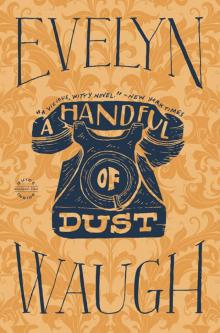 A Handful of Dust
A Handful of Dust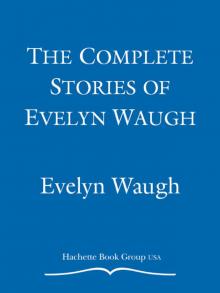 Complete Stories of Eveyln
Complete Stories of Eveyln Brideshead Revisited
Brideshead Revisited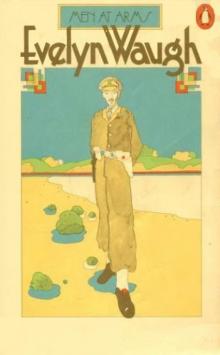 Men at Arms
Men at Arms Black Mischief
Black Mischief When the Going Was Good
When the Going Was Good Officers and Gentlemen
Officers and Gentlemen Helena
Helena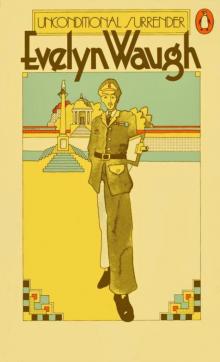 Unconditional Surrender
Unconditional Surrender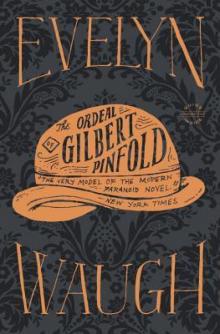 The Ordeal of Gilbert Pinfold
The Ordeal of Gilbert Pinfold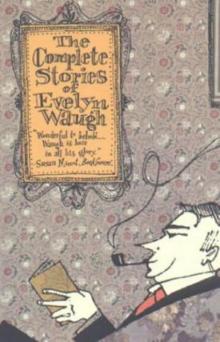 The Complete Stories Of Evelyn Waugh
The Complete Stories Of Evelyn Waugh